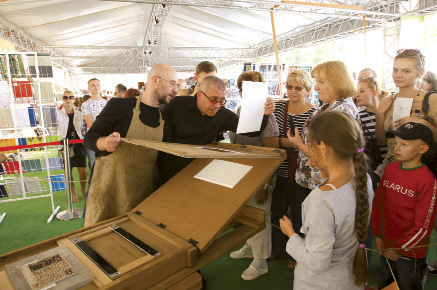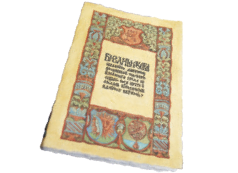Legendary enlightener Frantsisk Skorina, the printer hailing from Belarusian lands, explored five centuries later
Vladimir Lihodedov’s In Search of the Lost, launched a decade ago, has perhaps claimed the ultimate literary achievement: recreating 192 pages of Skorina’s Bible, on flax, using a 16th century printing machine: the Book of Genesis.

Vladimir Lihodedov at the printing press — a copy of Frantsisk Skorina’s machine
Vladimir tells us that, some time ago, he published his collection of old postcards, depicting cities and towns from across Belarus, in SB-Belarus Segodnya newspaper. “Various authors helped me in writing accompanying text. There was also a series on those countrymen who had glorified our homeland abroad, each illustrated by postcards from my collection. These series grew into separate volumes but In Search of the Lost extended beyond the limits of the printed page, generating over 50 exhibitions, including events held in Russia, the USA, Poland, France, Germany and Lithuania. Two monuments have been restored within the project. One is dedicated to the Orthodox psalmist Fiodor Yuzefovich, who died at the hands of rebels in 1863 in the village of Velikaya Gat. The other is inspired by a postcard inscribed: ‘The monument to soldiers of the Napoleonic Army who perished’ (situated along the Vileika-Molodechno highway). No one had realised that the monument existed: in France, Poland, or Russia. Having found the photo, we devoted the restored monument to all those who died in the 1812 war and we now plan to make an avenue honouring those who fought in ‘Three Patriotic Wars’ — on the same site.”
Vladimir Lihodedov’s collection boasts over 30,000 postcards, reflecting Belarusian history. They go on display at each of his exhibitions, with the reverse message also on show.
 One of the most mysterious, precious and little-studied periods in Belarusian history is that of Skorina and his heritage. Mr. Lihodedov undertook research across Europe’s museums and libraries, including studying ancient books and engravings. Finally, he worked with a timber-carving master to restore Skorina’s printing machine, using oak naturally dried for a decade. They bought an electronic version of Frantsisk Skorina’s Bible and conducted a ‘rehearsal’ in Bialystok: assembling the printing machine. This was then recreated in Belarus, to produce seven copies, created using authentic technology.
One of the most mysterious, precious and little-studied periods in Belarusian history is that of Skorina and his heritage. Mr. Lihodedov undertook research across Europe’s museums and libraries, including studying ancient books and engravings. Finally, he worked with a timber-carving master to restore Skorina’s printing machine, using oak naturally dried for a decade. They bought an electronic version of Frantsisk Skorina’s Bible and conducted a ‘rehearsal’ in Bialystok: assembling the printing machine. This was then recreated in Belarus, to produce seven copies, created using authentic technology.
“There are several others like the printing machine I managed to recreate: in Leipzig, Mainz and some other cities,” continues Mr. Lihodedov. “Of course, this isn’t an exact copy, since no one knows completely how the printing machine looked in the 16th century. At that time, there were around a hundred printing houses in Europe and each used a slightly different machine, but the principle was always the same.”
This is the first book ever created with the help of technology used by Frantsisk Skorina notes Mr. Lihodedov. He explains, “When I began to explore this issue, I understood that no one had ever created books using complete ‘from and to’ technology: from paper to printing on a restored machine. It’s possible to just use a modern printer to create a facsimile or reprinted edition, which enables all of us to buy a copy; there’s nothing difficult in this.”
The printing machine won’t now just gather dust, as Mr. Lihodedov plans to recreate Ivan Fiodorov’s Gospel: the first book in Slavonic ‘Oktoih’ language, as created by Schwaipolt Fiol. Only seven copies exist, all of which are kept in Russia.
“The printing machine is only a small part of what I can show and tell about the history of Belarusian book printing. However, I won’t show you all my cards. I dream of setting up a museum of printing but I can’t do this without assistance from a serious patron of arts, or without help from the state. I’d also love to study ancient history but I like to do things properly, and I realise that this will require a great deal of work, for which I currently have no time.”
Soon, the books created using technology from the time of Frantsisk Skorina will be available for public viewing. Three copies, illustrated by artist Boris Titovich, were recently on show at the Day of Belarusian Written Language, in Zaslavl, at Vladimir Lihodedov’s pavilion. His printing machine was the most popular attraction at the event.











